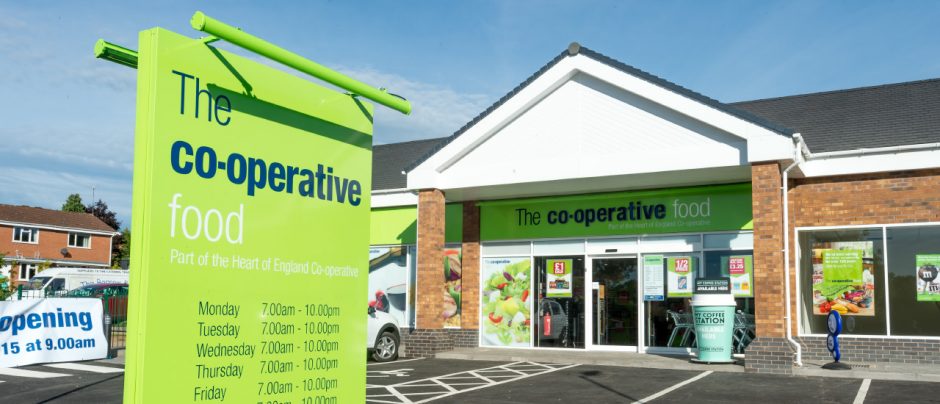Heart of England Co-op has announced an operating profit of £3.7m for the 53 weeks to 28 January, down from £5.8m the previous year.
But although the retail society says it endured “one of its toughest trading years” in 2022, its net worth has increased by 0.3% to £53m. Turnover was 91.8m, up from £90.9m the previous year.
CEO Ali Kurji says various factors outside the society’s control combined to reduce its bottom line – pointing to the war in Ukraine, the cost-of-living crisis, exceptional expenses totalling £542,886 and a write-down of investment property values to the tune of £88,576.
Policies are continuing to be reviewed to ensure the society remains robust in future, he added.
“For example, while we have continued to operate without any borrowing, we are now in negotiations with our bank to secure business loans. This will help us to proceed with several projects we have committed to which will grow our business in the coming years.”
The society’s financial report warns that – in common with most final salary schemes – the Heart of England Co-op’s pension liability has sharply increased., with the deficit growing from £2.9m to £4.8m. The scheme was closed in 2012 to new employees who are now given the option of joining a defined contribution scheme.
Related: Heart of England Co-op reports Christmas sales boost of 6.83%
In terms of business performance, the continuing impact of the Covid pandemic and the huge hikes in energy costs sparked by the conflict in Ukraine “have combined to create the toughest of trading conditions,” said Mr Kurji.
“The situation was further compounded by interest rates rising to four per cent alongside double digit inflation levels. A number of businesses closed, and many people were forced to balance their spending between eating and heating.”

To make matters worse, the society faced an “unprecedented level of competition”, primarily from discounter food groups.
“The trading climate has been more volatile and more complex than previously experienced. Consumer confidence and spending remains at an all-time low as the cost-of-living crisis continues to bite. It is having a major impact on consumer spending and will continue to do so as some people are even having to rely on food banks to make ends meet.”
While the food division recorded a 1.14% increase in sales, margins came under “tremendous pressure” due to fierce competition and were down on the year before. There were also significant supply chain issues arising from a lack of availability of both local and imported products.
However, the year saw two new purpose-built stores launched in Lower Heathcote, Warwick and Cross Keys, Bedworth, which are both performing above their budgeted targets.
Related: Annual Q&A with Ali Kurji, CEO, Heart of England
The society, which has 172,000 members, also carried out a major refurbishment and extension of its Hillmorton store in Rugby.
Another highlight was the opening of a new Bewiched in-store coffee shop at the society’s Balsall Common food outlet in Coventry. Two further Bewiched franchises – at Shires Retail Park in Royal Leamington Spa and a drive thru in Wellingborough – will follow this year.
Heart of England’s funeral division reported a 2.55% decrease in sales, but the results were in line with expectations. Nearly £1m was invested in purchasing eight eco-friendly, hybrid ceremonial vehicles.
In 2022, the society introduced a cost-of-living action plan for both shoppers and colleagues. The package of measures included increasing the discount on the members reward scheme from two to three per cent.
Discounts on food shopping were doubled for staff who were also offered free breakfasts and sanitary products. The initiative was featured on BBC TV with the chief executive and various employees interviewed for the Midlands Today programme.
Despite the economic situation, Heart of England continued to offer substantial support to worthwhile causes in its trading area. More than 225 donations were made to local charities and community groups totalling £40,200.
Separately, Coventry and Warwickshire Mind received £15,000 which was raised by staff and shoppers across 37 food stores. The society made an additional contribution to top up the sum collected.
Surplus food from the co-op was passed to FareShare during the year for distribution to struggling families – providing more than 140,000 free meals over a 12-month period.
“The profits we generate produce a direct benefit for our primary stakeholders which are our customers, members, employees, and local communities,” said Kurji. “We often refer to it as the Heart of England Co-operative difference.”
But the report warns that the society is braced for “an extremely challenging and uncertain 2023”.
“All the economic indicators are pointing towards a slowdown in the economy,” said Kurji. “The government cap on electricity will be raised in April, adding further pressures on households and businesses. We will also need to contend with Living Wage increases and higher warehouse distribution costs.”
Bur he added he remains “optimistic about our society’s prospects as one of the leading regional co-operative societies.
“We will continue to plough back a major proportion of our profits into improving our shops and other facilities, while seeking new profitable opportunities to expand our business through the heart of England – and beyond.”